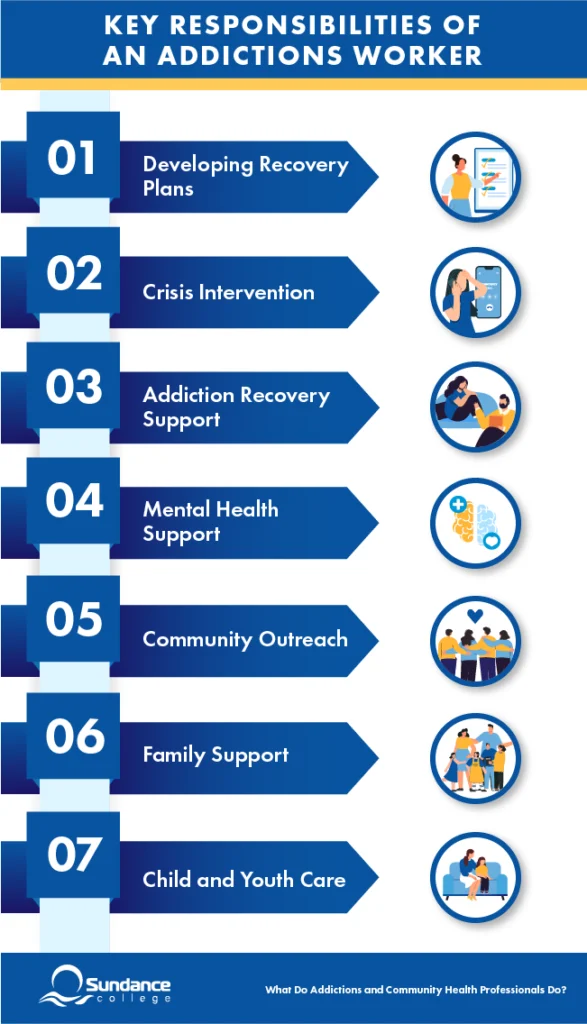Blog / What Do Addictions and Community Health Professionals Do?
What Do Addictions and Community Health Professionals Do?

Addictions and Community Health Professional Diploma
- Addictions Worker
- Youth Support Worker
- Family Support Worker
- Drop-in Centre Worker
Table of Contents
“The opposite of addiction is not sobriety – it’s connection.” – Johann Hari.
Addictions and community health workers act as the bridge between people who are struggling with addiction and the vital support they need to rebuild their lives. Every worker, no matter their profession, in the addictions field not only works to reconnect individuals with their families and community but provide them with new connections to essential resources that can help them on their journeys to recovery.
By the end of this article, you will understand the crucial role addiction workers play in our society and get a closer look at their responsibilities and the impact they have on the lives of those they support.
Listen to: What Do Addictions and Community Health Professionals Do?
Daily Tasks for Addictions and Community Health Workers
Sundance College’s Addictions and Community Health Professional instructor, Cinthya B. breaks down some of the day-to-day tasks for addictions workers:
“Addictions workers assist social workers, counsellors, case managers, and other healthcare professions in developing recovery plans. They also facilitate support groups and monitor clients’ progress.”
When you become an addictions and community health professional, some of your core responsibilities may include:
- Conducting Client Assessments: You’ll gather information from clients to understand their immediate needs and history.
- Monitoring Progress: You will regularly check in with your clients to evaluate their progress and make necessary adjustments to their care plans.
- Crisis Management: You will actively address urgent situations, whether related to mental health or substance use, to ensure clients receive the necessary emergency care.
- Coordinating Care: You will be liaising with community resources and services to make sure clients have access to the support they need, such as housing and healthcare.
- Documentation: You’ll be keeping detailed records of daily interactions, interventions, and updates to client care plans.
- Following Up with Clients: Part of your role will be checking in with clients after connecting them with external services to check that they’re receiving the support they need.
Daily duties for addictions and community health professionals are diverse and always impactful. Each day brings new opportunities and rewards, with new chances to make a meaningful difference in the lives of others.
Serena N., another instructor from Sundance College’s Addictions and Community Health diploma program, shares, “every interaction in the field can have a huge effect on the client… Those small interactions are huge. We have to make sure that we’re talking about empathy and compassion and that we’re reducing harm in any way, shape or form.”
Responsibilities of Addictions and Community Health Workers

While the daily tasks of addiction workers focus on the immediate needs and support of clients, their overall responsibilities cover a broader range of duties that work towards the long-term goals of recovery and community support.
Developing Recovery Plans
Addictions and mental health professionals help to create recovery plans for clients. This doesn’t just require paperwork to be filled out and filed correctly – it requires an understanding of each individual’s unique situation.
When you work in this field, you will sit down with clients to talk about their goals, challenges, and what support they need. From there, you will put together a personalized plan to help them move forward. A requirement of your role will be to monitor and regularly update the plan based on the client’s progress.
Crisis Intervention
When a crisis happens, it will be you, as the addictions worker, who will step in and provide support. Whether it’s dealing with a relapse or a mental health emergency, you’ll be required to stay calm and provide the right kind of support for the situation. This could mean calling emergency services, helping someone de-escalate, or simply being there to listen. Your quick thinking and compassionate approach in crisis situations will make a difference in tough situations.
When dealing with a crisis, or any other situation with clients, Serena emphasizes the importance of trauma-informed care when approaching harm reduction:
“Make sure that you have a trauma-informed care perspective and make sure you have conversations with your supervisor, your coordinators, your coworkers. Make sure everyone is on board and is reducing harm with every interaction.”
By staying focused on harm reduction strategies and client-centered care, you can effectively manage crises while supporting clients’ long-term recovery.
Addiction Recovery Support
Another key responsibility of addictions and community health professionals is helping clients access the resources they need to support their recovery.
This might involve connecting them with healthcare services, social support services, or employment, daycare, and housing resources. It may also include drawing on your knowledge of the relapse prevention (RP) model and proactive and reactive intervention techniques, as well as facilitating support groups for addiction.
By doing this, you can ensure that clients receive comprehensive care that addresses all aspects of their recovery journey.
Mental Health Support
Many clients face mental health challenges alongside addiction. One of your responsibilities as an addictions worker can be to provide vital support in this area by educating clients and their families about mental health, speaking on community mental health, and offering strategies for managing stress, and coordinating with mental health services.
Community Outreach
Beyond individual care, addictions and community health workers are often working in community outreach programs. This helps addictions workers raise awareness about mental health and addiction, promote prevention strategies, reduce stigma and provide preventative care to individuals who need it.
Child and Youth Care
In your role, you may work with children and youth affected by addiction who need specialized care. If your role involves a focus on this demographic, you will offer tailored support to young individuals struggling with addictions themselves or experiencing it within their family. By providing early intervention and education, you can help to protect young people from the long-term effects of addiction and mental health disorders.

Become an Addictions and Community Health Professional
A career as an addictions and community health worker is a meaningful path for someone who is passionate about making a positive impact on their community and supporting individuals through tough times.
The field offers a rewarding opportunity to help individuals rebuild their lives, reconnect with their families and wider communities, and achieve lasting recovery. It is also a field that requires foundational knowledge that comes with the right education. Cinthya emphasizes:
“Everyone entering the field needs to have education in harm reduction, high risk populations, psychology, ethics, and relapse prevention and intervention. Education is huge is this field.”
The best way to start your journey towards becoming an addiction worker is to enroll in the career-focused Addictions and Community Health Professional diploma program. Your program will be taught by industry-experienced instructors like Cinthya and Serena, who have over 20 years of combined experience working in mental health, addictions, and community health.
It will also include a 7-week practicum in a real-world setting, where you will gain not only knowledge and skills, but practical, hands-on experience that will help you begin and succeed in your new addictions and community health career.
Related Blogs
Subscribe for more career advice
Blog Categories
Share on:
